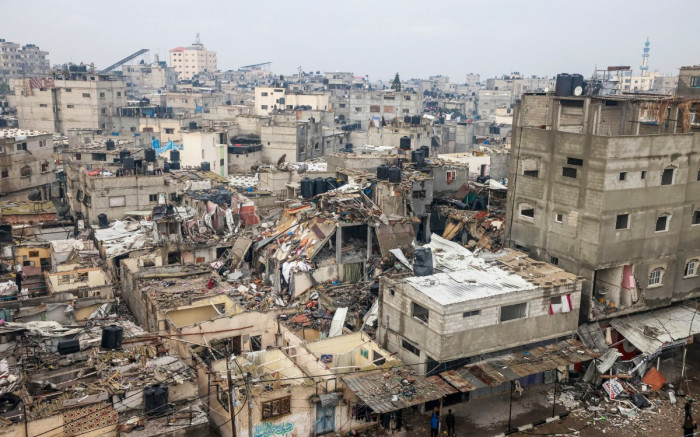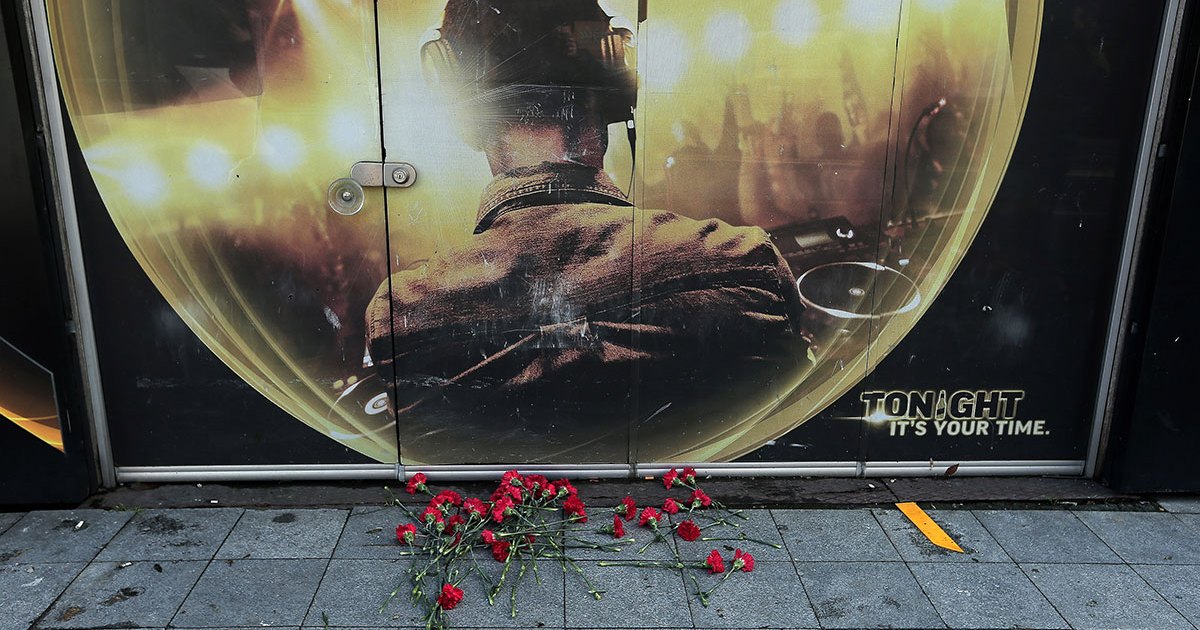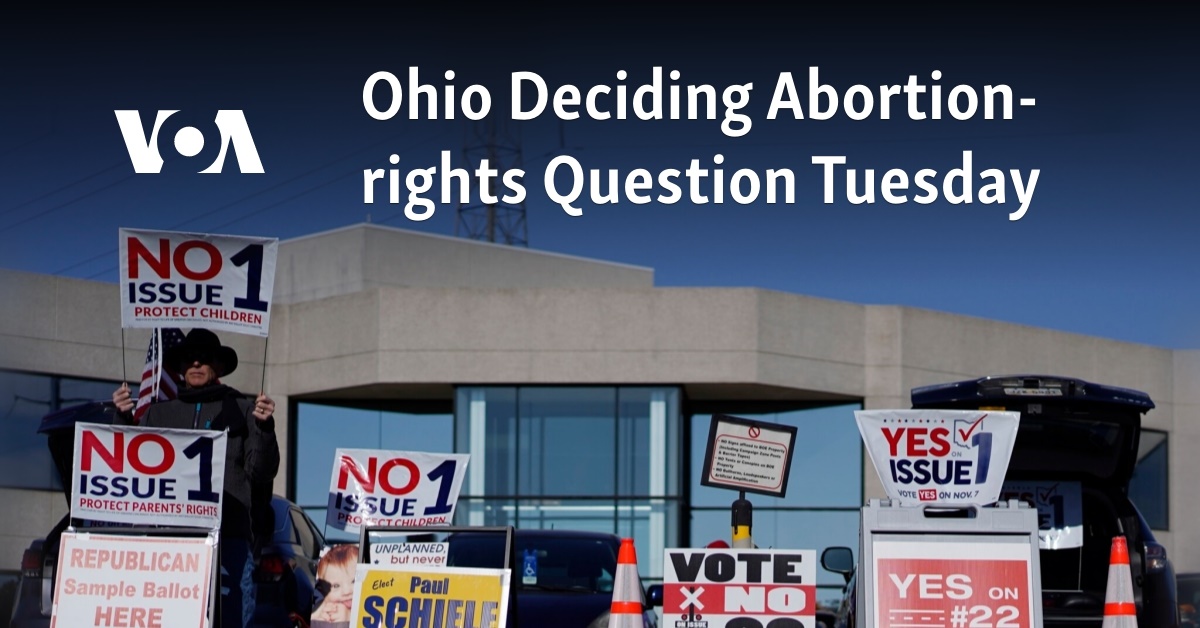
U.S. President Joe Biden, whose government provided billions of dollars in military aid to Israel, issued his sharpest criticism yet of the war on Wednesday, saying Israel’s “indiscriminate bombing” of the Gaza Strip was weakening international support.
This image shows the damage after the Israeli bombardment in Rafah in the southern Gaza Strip on December 13, 2023, as fighting continues between Israel and the Palestinian militant group Hamas. Image: AFP
UNDEFINED – Israel bombed Gaza on Thursday just as a senior White House adviser was due to arrive in Jerusalem, growing a divide over U.S. demands for its ally to exercise restraint.
The war, now in its third month, began after attacks on Israel by the Palestinian militant group Hamas on October 7, which Israeli officials said killed 1,200 people, mostly civilians.
It has left the besieged Gaza Strip in ruins, killed more than 18,600 people, mostly women and children, according to the Hamas-run health ministry, and devastated homes, roads, schools and hospitals.
The ministry said at least 19 people were killed in Israeli airstrikes across the Gaza Strip early Thursday.
In the West Bank, which has also seen an increase in violence since October 7, two people were killed in Israeli strikes in the town of Jenin, according to the Palestinian Authority.
U.S. President Joe Biden, whose administration has provided billions of dollars in military aid to Israel, issued his sharpest criticism yet of the war on Wednesday, saying Israel’s “indiscriminate bombing” of the Gaza Strip was weakening international support.
But Israeli Prime Minister Benjamin Netanyahu doubled down on his offensive, promising: “We will do nothing less than this until the end, until victory.”
And Secretary of State Eli Cohen said the war against Hamas would continue “with or without international support.”
On Thursday, Biden’s national security adviser Jake Sullivan was scheduled to arrive in Jerusalem for talks with Netanyahu and his war cabinet.
Sullivan said at a Wall Street Journal event ahead of his trip that he would discuss a timetable for ending the war and urge Israeli leaders to “move to a different phase than the type of high-intensity operations we are seeing today.”
Netanyahu said there was also “disagreement” with Washington over how Gaza should be governed after the conflict.
Hamas chief Ismail Haniyeh said on Wednesday: “Any agreement in Gaza or in the Palestinian cause without Hamas or the resistance groups is a deception.”
He said Hamas was ready for talks that could lead to a “political path that secures the right of the Palestinian people to an independent state with Jerusalem as its capital.”
“DARKEST CHAPTER”
Diplomatic pressure on Israel to better protect the civilian population is increasing. The UN General Assembly this week overwhelmingly supported a non-binding resolution calling for a ceasefire.
While Washington voted against it, the resolution was supported by allies Australia, Canada and New Zealand, which said in a rare joint statement they were “concerned about the ever-shrinking safe space for civilians in Gaza.”
CNN reported on Wednesday, citing US intelligence, that nearly half of the air-to-surface munitions used by Israel in Gaza since October 7 were unguided, which could pose a greater threat to civilians.
The head of the U.N. agency for Palestinian refugees, Philippe Lazzarini, said Wednesday that Gazans are “facing the darkest chapter of their history.”
Wintry rains lashed the area where the United Nations estimates 1.9 million of Gaza’s 2.4 million residents have been displaced and are living in makeshift tents as supplies of food, drinking water, medicine and fuel run out.
Ameen Edwan said his family had camped in their thousands at the Al-Aqsa Martyrs Hospital compound in central Gaza.
“Rainwater came in. We could not sleep. We tried to find nylon covers but couldn’t find any, so we resorted to rocks and sand” to keep the water out, he said.
The southern city of Rafah, near the Egyptian border, has become a vast camp for displaced people, with hundreds of tents constructed of wood and plastic sheeting.
“We spent five days outdoors. And now the rain has flooded the tents,” said one displaced resident, Bilal al-Qassas.
Gusts of wind shook the fragile structures as people tried to reinforce them with more plastic sheeting.
“Where are we migrating to? Our dignity is lost. Where do women relieve themselves? There are no toilets,” said 41-year-old Qassas.
The UN warned that the spread of diseases – including meningitis, jaundice and upper respiratory infections – had increased.
Gaza’s hospital system is in shambles and Hamas authorities said vaccines for children had run out and warned of “catastrophic health impacts.”
The Hamas-controlled Health Ministry said Israeli forces opened fire on the wards of Kamal Adwan Hospital in northern Gaza.
The army has not yet commented, but Israel has repeatedly accused Hamas of using hospitals, schools, mosques and vast tunnel systems beneath them as military bases, something Hamas denies.
GROWING NUMBER OF TROOPS
In Israel, the army is coming under increasing pressure to limit the deaths of troops and ensure the release of hostages.
It has lost 115 soldiers, including 10 on Tuesday, the deadliest day since the ground assault began on October 27.
Hamas also took around 240 hostages in the October 7 attack – the deadliest in Israel’s 75-year history.
Hamas released dozens of hostages in exchange for Palestinian prisoners held by Israel during a week-long ceasefire last month, but others were found dead.
Families of hostages said on Wednesday they had demanded “an immediate explanation from the prime minister and Cabinet members” after local media reported that the government had rejected a proposal to send officials to Qatar for a second round of hostage negotiations.
The Israeli Embassy in Romania announced on Wednesday the death of 41-year-old Israeli-Romanian Tal Haimi, who was being held in Gaza.
Washington and London announced further sanctions against Hamas on Wednesday, targeting “key officials who continue Hamas’s violent agenda.”
Fears of an escalation of the conflict remain, with daily incidents occurring along Israel’s border with Lebanon, where the Iranian-backed Hezbollah is based.






Recent Comments